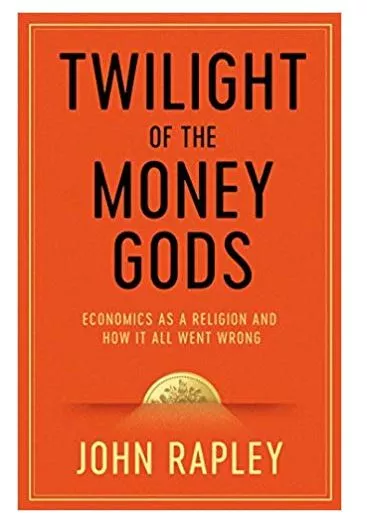 Often in our daily discourse we tend to focus only on the specifics and at a very micro level. This is accentuated with the advent of social media reading habits. The holistic understanding is missed and hence the context is subverted.
Often in our daily discourse we tend to focus only on the specifics and at a very micro level. This is accentuated with the advent of social media reading habits. The holistic understanding is missed and hence the context is subverted.
The things that we use, the place of work, our thought process and every other thing that we experience is linked to several events of the past. For a serious learner it is imperative to understand how we came into being and in the current form in which we exist today. History is the starting point.
John Rapley, in his book the “Twilight of the Money Gods” has eloquently described the evolution of economic thought. He brilliantly threads Religion, Politics and Economics cohesively.
The ruling elite used one to support the other as per their convenience and success was only matter of chance. Credit for each theory survives only till another emerges, hence, it is emphasized that economics should not be compared to science. “ ‘But,’ an economist might object, ‘we alone among social scientists get a Nobel Prize for “economic science”. Even mathematicians don’t get that!’ Well, yes, but so what? The Nobel Prize in economics exists only because the economists created it, and it’s a science only because – no prizes for this one – the economists called it a science.” Science evolves in a linear fashion with one generation building on the previous one either to improve or disprove it. “Economics, however, moves in cycles. A given doctrine can rise, fall and then later rise again.”
There is a general assumption that the governments understand how to go about managing the economics of a country. “It’s like aeroplane engineering. You don’t really know how that 400-ton tube of steel you’re sitting in can lift off the ground and get you across the ocean, but you trust that someone else does.” The book quotes how mis-timed implementation of economic theories have caused large scale destruction in societies. Political leaders back economic theories, and promote relevant academicians to generate the required votes for their survival. Hence we go on to study them in school and believe in them. The critical analysis across the spectrum of time and geography provides the much required holistic perspective and the urgent need to open up to basic realities.
The author, John Rapley is a political economist at University of Cambridge. His inclination towards developmental studies, globalization and governance is amply reflected in the narrative of the book. Lot of effort has gone into drawing the picture of each event in the past and the contemporary theory that emerged. While reading becomes easy due to the indulgent humor, the sanctity of the point to be conveyed is never lost. For those interested in deep understanding of the evolution of economic thought this book is a perfect primer.
“Abba Eban used to say that humans always act wisely, but only after first exhausting all other options. Maybe we’re running through the options right now, of which denial appears pretty attractive.”



